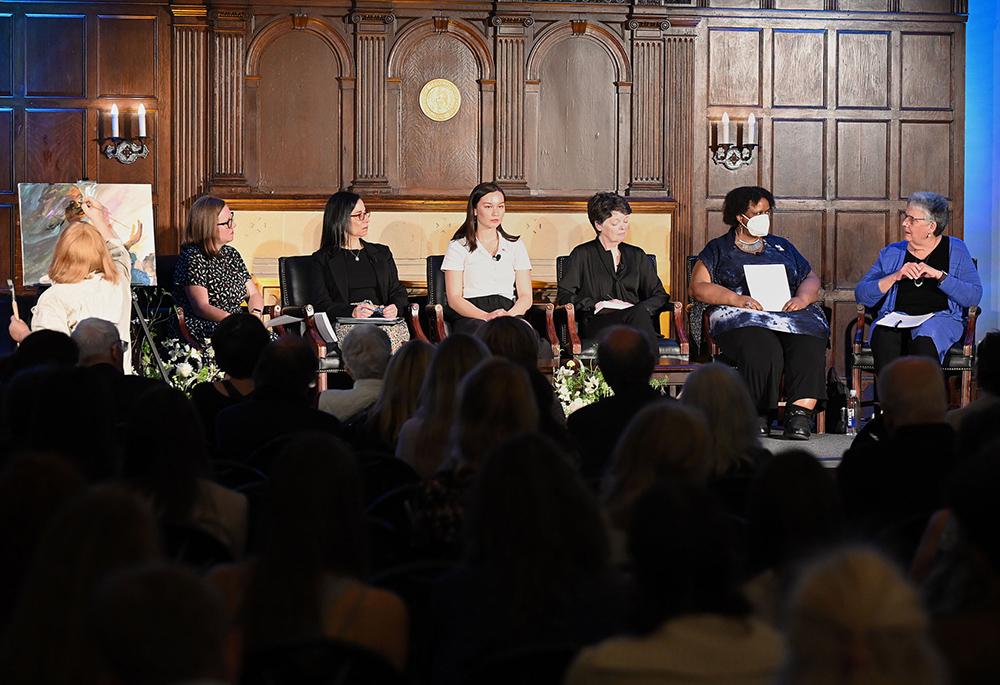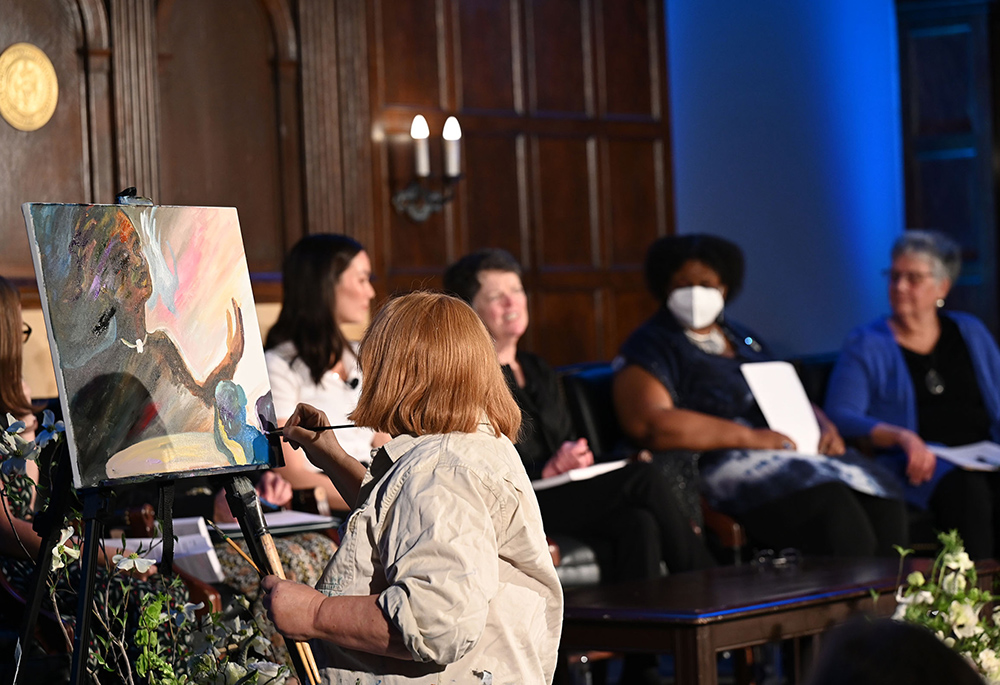
The panel is pictured for the April 17 event "Faith, Feminism, and Being Unfinished: The Question of Women's Ordination" at Georgetown University. From left: Annie Selak, associate director of the Georgetown University Women's Center; Teresa Delgado, dean of the College of Liberal Arts and Sciences at St. John's University; Lin Henke, Georgetown student; novelist Alice McDermott; Angele Cabrini White, founder and chairperson of the Black and Women's History Ministry at St. Martin of Tours Catholic Church in Washington; and Mary Hunt, co-founder and co-director of the Women's Alliance for Theology, Ethics, and Ritual (WATER). (Courtesy of Georgetown University/Leslie E. Kossoff)
Several institutes at Georgetown University hosted a conversation on women's ordination in the Catholic Church on April 17, with a five-member panel of theologians and local lay leaders discussing the church's answer on the issue as "unfinished."
Among the speakers was acclaimed novelist and National Book Award winner Alice McDermott, who reflected on the meaning of the sacraments and said the church's practice of ordaining only men as ministers had become something like a counter-sacrament for her.
"If there are outward signs of inner grace, then surely there are outward signs of inner corruption as well," said McDermott, author of eight novels. "Outward signs that betray our faults, our sinfulness and our failures."
"It grieves me to say that the all-male priesthood of the Catholic Church, my church, has become for me just such a sign," she said.
Theologian Mary Hunt, co-founder and co-director of the Women's Alliance for Theology, Ethics, and Ritual, or WATER, said the decision not to ordain women "has left the institutional Roman Catholic Church in an intellectually and morally untenable position without much credibility to announce any good news."

The panel is pictured for the April 17 event "Faith, Feminism, and Being Unfinished: The Question of Women's Ordination" at Georgetown University. From left: Annie Selak; Teresa Delgado; Lin Henke; Alice McDermott; Angele Cabrini White; and Mary Hunt. To the panel's left, St. Joseph Sr. Celeste Mokrzycki, chaplain for the School of Nursing and the School of Health at Georgetown, paints during the event. (Courtesy of Georgetown University/Leslie E. Kossoff)
"The loss of the enormous talent and generosity of women and nonbinary persons wishing to engage in Catholic sacramental ministries has diminished the quality and quantity of ministry for all," she said.
The Georgetown event was held in part to honor the work of Holy Names of Jesus and Mary Sr. Anne E. Patrick, a moral theologian who died in 2016. In 1975, Patrick wrote an essay entitled "A Conservative Case for the Ordination of Women," which argued that ordaining women would help with a then-looming crisis of decline in priestly numbers and would "touch the hearts of women who … are growing increasingly conscious of their dignity as persons."
Besides McDermott and Hunt, the speakers for the event included theologian Teresa Delgado, dean of the College of Liberal Arts and Sciences at St. John's University in Queens, New York; Angele Cabrini White, founder and chairperson of the Black and Women's History Ministry at St. Martin of Tours Catholic Church in Washington; and Lin Henke, a Georgetown senior.
Jane Varner Malhotra, director of advancement communications at Georgetown and a niece of Patrick, opened the event. Malhotra said she has been discerning a call to priesthood herself.
"To me, and to many of us in the church, the question of women's ordination is, yes, institutional but also deeply personal, and sometimes painful," she said. "But it's also an experience of joy and creativity, because with God all things are wildly possible."

Jane Varner Malhotra, director of advancement communications at Georgetown University, speaking at the April 17 event on "Faith, Feminism, and Being Unfinished: The Question of Women's Ordination" (Courtesy of Georgetown University/Leslie E. Kossoff)
White offered a wide overview of U.S. Catholic history, focusing on how for the early part of American history Catholics were often a persecuted minority group. She said that history shows that change can take a long time to occur.
"Change takes learning from mistakes and working towards better," she said. "It does not mean settling for something that is unjust. It does not mean seeking equality. It means gaining equity."
"It's not that we as women want to be accepted," said White. "It is that many men in leadership are not receptive. It's not that women don't already lead in the church. It's just that many men prefer the club of men in leadership."
Advertisement
Henke, who is preparing to graduate and plans to pursue graduate education in ministry, said the "theological stakes are very high" in terms of whether the church allows women's ordination.
"It is not enough to say that women could resemble God, as long as they keep parts of themselves toned down," said Henke, who is a non-Catholic Christian. "We cannot let our purpose and worth be defined by a narrow and inaccurate view of God."
During the question-and-answer session following the initial discussion, a Georgetown student asked the panelists how they understand the church's official position, as described in Pope John Paul II's 1994 apostolic letter Ordinatio Sacerdotalis, that it has no authority to ordain women as priests.
Delgado suggested that adding more voices to the discussion about the church's authority on the matter might help in future conversations.
"Perhaps the more diverse voices that we have … in the conversation, allows us to find that truth more clearly, in a way that has been obscured in the past, because there have been so few," said the theologian. "We clearly see that adding more voices to that very question about where is the truth will lead to different kinds of answers."

St. Joseph Sr. Celeste Mokrzycki, the chaplain for the School of Nursing and the School of Health at Georgetown, paints during the April 17 event on "Faith, Feminism, and Being Unfinished: The Question of Women's Ordination" at Georgetown University. (Courtesy of Georgetown University/Leslie E. Kossoff)
"I would say: Why be afraid of that? Why be afraid of the possibility that somehow what we have known to be true may not have been?" said Delgado.
"We need to see truth with a broader lens," she said. "I'm thinking that that's the moment we are in right now. And perhaps there are some who don't want to engage in that questioning, because it will crumble the truth that they've known."
The event was titled "Faith, Feminism, and Being Unfinished: The Question of Women's Ordination." It was sponsored by Georgetown's Women's Center, and co-sponsored by the Berkley Center for Religion, Peace and World Affairs; the Office of Mission and Ministry; the Georgetown Women's Alliance; the Gender+ Justice Initiative; and the Department of Theology and Religious Studies.
Annie Selak, a theologian who serves as the associate director of the Women's Center, moderated the discussion. The event also featured a simultaneous, live art painting by St. Joseph Sr. Celeste Mokrzycki, the chaplain for the School of Nursing and the School of Health at Georgetown.








